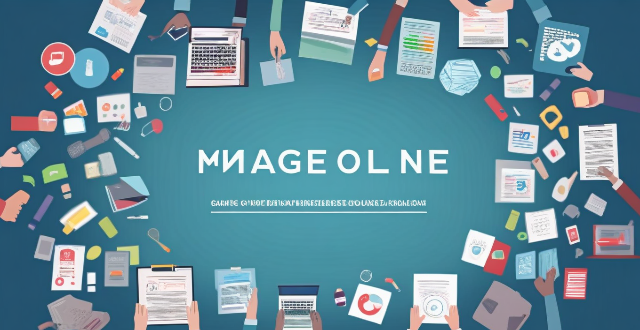Online Image

How can I maintain a consistent personal image across different platforms ?
Maintaining a consistent personal image across different platforms is crucial for building a strong online presence and establishing trust with your audience. To achieve this, define your brand identity, use a consistent tone of voice, create a style guide, be active on all platforms, and monitor your online presence regularly. By following these tips, you can ensure that your personal image remains consistent and positive across all platforms.

How can I measure the effectiveness of my personal image ?
Measuring the effectiveness of your personal image is crucial for maintaining a positive reputation and achieving your goals. Here are some ways to evaluate how well your personal image is working for you: - Self-Assessment: Ask yourself if you're confident in your appearance, communication style, and behavior, and if you receive positive feedback from others. - Feedback from Others: Seek honest opinions from trusted friends, family members, or colleagues about your personal image. - Observe Reactions: Pay attention to how people react when they meet you for the first time to gauge your first impression. - Track Your Success: Keep track of your achievements and setbacks to see if your personal image is helping you achieve your goals. - Online Presence: Check your social media profiles and websites to ensure they reflect the image you want to project, and pay attention to online engagement as an indicator of effectiveness. - Professional Development: Consider taking courses or attending workshops to enhance your personal image, and evaluate whether these efforts have led to improvements. Continuously assess and adjust your approach as needed to maintain a positive and impactful personal brand.

In what ways can social media impact my personal image ?
Social media has become an integral part of our daily lives, and it can significantly impact our personal image. Here are some ways in which social media can affect how others perceive us: Positive Effects: - Building a Professional Brand: Social media provides networking opportunities and allows individuals to showcase their achievements and expertise. - Enhancing Personal Reputation: Individuals can project a positive image by sharing accomplishments, hobbies, and interests, and engage with followers to build a loyal community. Negative Effects: - Damaging Professional Reputation: Posting unprofessional content or oversharing personal information can harm one's professional image and lead to privacy breaches. - Harming Personal Reputation: Cyberbullying and sharing false information can damage mental health and make individuals appear unreliable or irresponsible. Managing Your Online Presence: - Best Practices for Maintaining a Positive Image: Monitor your content, use privacy settings, think before you post, and maintain consistency across platforms. - Handling Negative Situations: Address mistakes proactively and seek professional help if necessary. Overall, social media can be a powerful tool for enhancing or damaging one's personal image. By being mindful of what you share online and actively managing your digital footprint, you can use social media to your advantage while minimizing potential risks.

How often should I update my personal image to stay relevant ?
The text discusses the importance of updating one's personal image to stay relevant in a rapidly changing world. It emphasizes that updating your personal image doesn't mean chasing every trend but evolving authentically to represent who you are and where you're going. The frequency of updates should be based on significant life changes, seasonal changes, and an annual review of your image. Elements to consider for updates include appearance, online presence, skillset, and network. Practical tips for updating your personal image include staying informed, seeking feedback, investing in quality, and embracing change. Overall, the text suggests that regular updates to your personal image can help maintain and enhance your personal brand, opening doors to new opportunities and ensuring success in both personal and professional life.

What are the benefits of having a well-defined personal image ?
Having a well-defined personal image is crucial for individuals in both their personal and professional lives. It can significantly impact how others perceive them, which can lead to various opportunities and advantages. A well-defined personal image can help establish credibility and trustworthiness, make positive first impressions, increase professional opportunities, enhance self-confidence, improve interpersonal relationships, become a more influential leader, and gain greater control over one's reputation. By actively managing how you present yourself online and offline, you can ensure that people have an accurate understanding of who you are and what you stand for.

How can networking events help me enhance my personal image ?
Attending networking events can significantly enhance your personal image by establishing industry presence, expanding professional circles, offering learning opportunities, showcasing expertise, and building a positive reputation. To make the most out of these events, dress appropriately, be prepared with an elevator pitch, practice active listening, follow up with connections, and contribute value whenever possible. These strategies not only improve your professional image but also open doors to new opportunities and collaborations.

How do celebrities manage their online presence and reputation on social media ?
Celebrities manage their online presence and reputation on social media by hiring a social media manager, maintaining consistency across platforms, engaging with fans, promoting positive messages, handling criticism gracefully, and monitoring their image. These strategies help them maintain a positive online presence while connecting with fans and promoting their work effectively.

What are the long-term effects of neglecting my personal image ?
Neglecting your personal image can have long-term negative effects on various aspects of your life, including relationships, career opportunities, and overall well-being. It can make forming new connections difficult, strain existing relationships, limit professional advancement, and make finding employment more challenging. Additionally, neglecting your personal image can lead to lower self-esteem, confidence, and increased stress and anxiety. However, improving your personal image through quality clothing, good hygiene, regular exercise, practicing good posture, and seeking professional help when needed can positively impact your life in numerous ways.

How do celebrities balance their public image with their charity work ?
Celebrities navigating the challenge of maintaining a positive public image while engaging in charity work can adopt several strategies: 1. **Authenticity**: Genuine care for supported causes resonates with the public and fans. 2. **Transparency**: Open communication about charitable activities builds trust and avoids overpromising. 3. **Alignment with Personal Brand**: Selecting causes that align with their personal brand maintains consistency in their public image. 4. **Engage with Fans**: Interacting with fans about charity work fosters community and encourages involvement. 5. **Consistency**: Regular involvement shows long-term commitment rather than fleeting interest. 6. **Avoid Controversy**: Stay away from polarizing issues to prevent backlash on public image and charity. 7. **Collaborate with Other Celebrities**: Joint efforts amplify reach and show unity among peers. 8. **Measure Impact**: Showcasing tangible results demonstrates the effectiveness of their charitable efforts. 9. **Seek Professional Advice**: Consulting experts helps navigate complexities in balancing public image and charity work. By following these strategies, celebrities can balance public image with charity work, ensuring benefits for both their supported causes and their reputation.

What role does clothing play in developing a professional image ?
Clothing plays a crucial role in developing a professional image by impacting first impressions, communicating professionalism, and influencing perception. It can also promote diversity and inclusion in the workplace. By dressing appropriately for the job or industry, you set a positive tone for your professional interactions, boost confidence, enhance credibility, and represent your personal brand or company. Adhering to dress codes demonstrates an understanding and respect for the culture of your field, while neat and well-organized attire shows attention to detail. Studies suggest that dressing more formally can make you appear more competent and knowledgeable, while appropriate clothing can also make you seem more approachable and adaptable. Allowing some degree of personal expression through clothing can promote diversity and individuality within the workplace, while respectful dressing can acknowledge diverse cultural backgrounds in a multicultural work environment. Overall, clothing is a tool for communicating your professional identity, and finding the right balance between professionalism and personal style is key to enhancing your professional image and effectiveness.

How do celebrities manage their public image to support their personal brand ?
Managing public image is crucial for celebrities to support their personal brand and overall success. They build a strong personal brand by identifying unique qualities, values, and goals, collaborate with experts in fashion, styling, and branding, and maintain consistency across platforms. Social media plays a significant role, with effective strategies including engagement, content creation, and collaborations. Privacy is maintained through selective sharing, private accounts, and security measures. Crisis management involves quick response, damage control, and rebuilding trust. Collaborating with charities and philanthropic organizations enhances public image, while professional appearance and conduct are maintained through grooming, wardrobe, and public speaking skills.

How do national sports teams represent their country's image on the international stage ?
National sports teams play a crucial role in representing their country's image on the international stage. They are seen as ambassadors of their nation, showcasing values, culture, and spirit through their performances and behavior. Athletes inspire national pride and promote cultural exchange, uphold ethical standards, and embody national spirit. Successful performances enhance prestige, while handling setbacks with grace demonstrates resilience. Supporting national sports teams fosters national identity and pride globally.

What kind of accessories are appropriate and enhance a woman's professional image ?
In the article "Appropriate Accessories to Enhance a Woman's Professional Image," the author discusses the importance of selecting the right accessories to enhance a woman's professional image. The author suggests that women should keep their jewelry simple and understated, opt for classic timepieces, choose structured handbags that are large enough to carry essentials yet sleek enough to maintain a polished appearance, select well-chosen scarves in neutral colors, and consider ties or blazers for more formal settings. Overall, the key points emphasize the importance of keeping accessories simple, sophisticated, and practical to achieve a polished and professional look.

How do I ensure that my clearance sale doesn't negatively impact my brand image ?
Clearance sales are a common practice for many businesses, but it's essential to ensure that they don't negatively impact your brand image. Here are some tips on how to do so: 1. Set Clear Objectives: Before launching your clearance sale, set clear objectives for what you want to achieve. This will help you stay focused and avoid making decisions that could harm your brand image. 2. Be Transparent About the Sale: Be transparent about why you're having a clearance sale and what items are included. This will help customers understand the context of the sale and prevent any confusion or misunderstandings. 3. Maintain Quality Standards: Even though you're offering discounted prices, it's important to maintain your usual quality standards. Don't compromise on product quality or customer service just because it's a clearance sale. 4. Use Targeted Marketing: Use targeted marketing strategies to reach your ideal customers during the clearance sale. This will help you avoid attracting bargain hunters who may not be interested in your brand beyond the sale. 5. Offer Limited-Time Discounts: Consider offering limited-time discounts instead of slashing prices across the board. This will create a sense of urgency and encourage customers to make a purchase before the sale ends. 6. Follow Up With Customers: After the clearance sale is over, follow up with customers who made purchases. Thank them for their business and ask for feedback on their experience. By following these tips, you can ensure that your clearance sale doesn't negatively impact your brand image while still achieving your goals.

How can I distinguish myself from others with a unique personal image ?
**How to Establish a Unique Personal Image** 1. **Identify Your Passions and Interests**: List your hobbies and reflect on your values. 2. **Develop Your Skills and Expertise**: Keep learning and specialize in a niche within your field. 3. **Craft Your Style**: Create a signature style and pay attention to personal grooming. 4. **Build Your Digital Presence**: Curate social media profiles and create a personal website or blog. 5. **Network with Like-minded People**: Join communities and attend relevant events. 6. **Showcase Your Achievements**: Compile a portfolio and collect testimonials. 7. **Stay True to Yourself**: Maintain authenticity and focus on self-improvement.

Which website is considered the best for buying books online ?
The text discusses Amazon as the best website for purchasing books online due to its user-friendly interface, wide range of books, competitive pricing, fast shipping and delivery options, customer reviews and ratings, and easy returns and refunds.

How do I find buy one get one free offers online ?
To find buy one get one free offers online, use coupon websites, check store websites, follow brands on social media, join loyalty programs, search online forums and discussion boards, and set up deal alerts.

How can I protect my personal information online ?
In today's digital age, protecting your personal information online is crucial. To safeguard sensitive data, one should use strong and unique passwords, keep software and systems up-to-date, be careful with public Wi-Fi networks, be wary of phishing attacks, and limit the amount of personal information shared online. These steps can significantly reduce the risk of having personal information compromised online.

What are the benefits and drawbacks of using online curriculums in home education ?
The article discusses the advantages and disadvantages of using online curriculums in home education. On the positive side, online learning offers flexibility, a wide range of options, personalized experiences, exposure to diverse cultures, and cost-effectiveness. However, it also presents challenges such as limited social interaction, technical issues, lack of hands-on learning opportunities, overreliance on technology, and concerns about quality control and accreditation.

What are the benefits of shopping through global online platforms ?
The text summarizes the benefits of shopping through global online platforms. The key advantages include increased access to products, competitive pricing, convenience, variety of payment options, easy price comparison, reviews and ratings, direct shipping, cross-border shopping, and environmental friendliness. These benefits make online shopping an attractive option for consumers around the world.

How can I ensure that my online activity is private ?
Online privacy is a significant concern, and ensuring it requires proactive measures. Use strong passwords and two-factor authentication, be cautious with personal information, use encrypted communication channels, keep software up to date, manage privacy settings, use VPNs, be wary of phishing attacks, browse incognito/private mode, and clear your digital footprint. These strategies can enhance online privacy and reduce the risk of exposing sensitive information.

What role does social media play in shaping a celebrity's image and brand ?
The text discusses the role of social media in shaping a celebrity's image and brand. It outlines six key ways in which social media impacts a celebrity's public perception and personal branding: connecting with fans, controlling the narrative, promoting projects, endorsements and sponsorships, crisis management, and personal branding. The text emphasizes that social media is an integral part of modern society and plays a significant role in building a loyal fan base, generating buzz for projects, expanding reach and influence through endorsements, handling crises effectively, and developing a distinct personal brand.

Can you suggest some online shopping sites specifically for luxury goods ?
The article provides a list of seven online luxury shopping sites, each offering unique features for an enhanced shopping experience. These platforms include Farfetch, Net-a-Porter, MatchesFashion, MyTheresa, Ssense, Moda Operandi, and 24S, all of which cater to a global audience with high-quality products from various designers. Each site offers exclusive collections, personalized services, and sustainable practices, making them ideal for purchasing luxury goods online.

Are there any free online learning resources available for advanced learners ?
This text provides information about free online learning resources for advanced learners, including MOOCs, OERs, online forums and communities, as well as podcasts and videos. It mentions platforms like Coursera, edX, Udemy, Khan Academy, MIT OpenCourseWare, OpenStax, Project Gutenberg, Stack Exchange, Reddit, Quora, TED Talks, various podcasts, and YouTube channels.

What are some of the most secure online shopping platforms ?
Secure online shopping platforms are essential in protecting personal and financial information. Amazon, eBay, Walmart, Target, Best Buy, and Etsy are some of the most secure online shopping platforms available today. These platforms use advanced security measures such as SSL encryption and two-factor authentication to protect users' data. Additionally, they offer various payment options and excellent customer service. By choosing these reputable platforms, you can enjoy a safe and convenient online shopping experience.

What is the process of buying insurance online like ?
The text provides a detailed guide on how to buy insurance online. It outlines the process in eight steps: researching and identifying needs, selecting an insurance provider, getting a quote, reviewing policy details, completing documentation, making payment and receiving policy documents, confirmation and follow-up, and activating coverage. The benefits of buying insurance online include convenience, comparison, transparency, and speed. However, precautions such as ensuring security and legitimacy of the website, and fully understanding the policy terms should be taken.

Can I take online fitness instructor courses ?
Yes, you can definitely take online fitness instructor courses. In fact, there are many reputable organizations that offer online certification programs for aspiring fitness instructors. Here are some key points to consider: ## Benefits of Online Fitness Instructor Courses 1. **Flexibility**: Online courses allow you to learn at your own pace and on your own schedule. This is especially beneficial for those who have other commitments such as work or family responsibilities. 2. **Cost-effective**: Online courses are often more affordable than traditional in-person training programs. You can save money on travel expenses and accommodation costs. 3. **Wide range of options**: There are numerous online fitness instructor courses available, covering various areas of expertise such as yoga, Pilates, strength training, and more. 4. **Access to expert trainers**: Many online courses are taught by experienced and certified fitness professionals who share their knowledge and expertise through video lectures, interactive quizzes, and practical assignments. 5. **Continuous learning**: Online courses provide an opportunity for continuous learning and development. You can revisit the course materials anytime and stay up-to-date with the latest trends and techniques in the fitness industry. 6. **Career advancement**: Completing an online fitness instructor course can enhance your resume and open up new career opportunities within the fitness industry. ## How to Choose an Online Fitness Instructor Course When selecting an online fitness instructor course, consider the following factors: - **Accreditation**: Ensure that the course is accredited by a reputable organization or institution. This will ensure that the program meets industry standards and provides valuable credentials upon completion. - **Course content**: Check the course outline and make sure it covers all the necessary topics related to fitness instruction, including anatomy, physiology, exercise techniques, programming, and safety guidelines. - **Instructor qualifications**: Look for courses taught by experienced and certified fitness professionals who have a proven track record in the industry. - **Learning resources**: Ensure that the course provides access to high-quality learning resources such as video lectures, e-books, practice exercises, and interactive quizzes. - **Support and feedback**: Choose a course that offers regular support and feedback from instructors or mentors throughout the program. - **Community engagement**: Look for courses that provide opportunities for engagement with other students and fitness professionals through forums, discussion groups, or social media platforms. - **Pricing**: Compare the pricing of different online fitness instructor courses and choose one that fits your budget while offering quality education and resources.

How can individuals protect their privacy rights online ?
In today's digital age, protecting your online privacy is crucial to safeguarding your personal information from potential threats and misuse. Here are some key steps you can take to ensure your privacy rights are upheld while browsing the internet or using online services: Use strong passwords and two-factor authentication, be cautious with personal information, use encrypted connections, keep software up-to-date, review privacy settings regularly, and educate yourself about online scams and phishing attempts. By implementing these strategies, you can significantly enhance your online privacy and reduce the risks associated with sharing personal information on the internet.

What is online privacy and why is it important ?
The text discusses the definition and importance of online privacy, which is the ability to control personal information when using the internet. Online privacy protects sensitive data such as browsing history, location, communications, and personal details from being accessed, collected, or used without consent. It is important for protecting personal information, allowing control over personal data, enabling freedom of expression, building trust in digital services, and ensuring economic benefits. Best practices for online privacy include using strong passwords, keeping software up-to-date, being cautious on social media, avoiding public Wi-Fi, reviewing privacy policies, and monitoring financial statements for signs of fraud or identity theft.